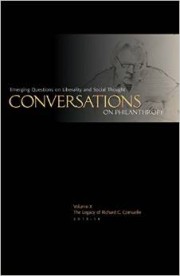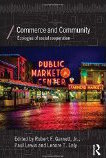Better and Worser Angels, and their Invisible Hands
In his essay “New Work for Invisible Hands” Richard Cornuelle evokes Adam Smith’s metaphor of the invisible hand, but challenges us to consider it in terms of our communal rather than our commercial activities. Adam Smith’s “invisible hand” is invisible for two reasons. One, of course, is that as a collective, gradual, and multitudinous process of what we would now call distributed computation, it would necessarily be imperceptible as a whole to its participants, and its results in terms of pricing would seem almost miraculous. When the stock market rises and falls, the language we use to describe it is not unlike the way the Greeks described the apparently arbitrary and unpredictable behavior of the gods, who were naturally invisible to humans except when they revealed themselves to the occasional hero or attractive princess. The market, like the god Mercury from which it gets its name, works in its mysterious way its wonders to perform.
But there is another aspect to that invisibility, which is that the workings of the market are deeply paradoxical in a way that is opaque to our moral intuitions. The results of the market process are demonstrably of enormous benefit to humankind (despite the unwelcome effects of its “creative destruction” and the disastrous penalties attendant upon nonparticipation in it). Yet the great good the market does is accomplished not so much by means of the better angels of our nature as by some of the worser ones: greed, fear, envy, covetousness, vanity, “mimetic desire” (Girard 1965), the desire for victory over one’s neighbor, and so on.
But here a profound problem arises. If we judge an activity by its source or seeds or maxim rather than by its results or fruits or unintended side-effects, the market must be evil, as left-wingers—and all right-thinking people who do not understand economics—in their heart of hearts believe. If the drivers of the market are private acts of selfish overreaching, then the market itself is tarred with that brush.
What makes this conundrum worse is our own modern theories of morality. Post-enlightenment ethics makes intentionality the sole datum of moral judgment. We have prided ourselves on having freed ourselves from the ancient superstitious categories of pollution, ritual purity, taboo, shame, magical powers and virtues, and special divine favor or election. We take into account only intended consequences. In so doing, we get rid of any communitarian basis for telling good from bad, and we substitute the private conscience and the private act of decision. Good intentions make an act good; bad ones make it bad. So, given our human incapacity for cognitive dissonance, the good the market does either cannot exist, or we all agree to not notice it, and it becomes socially and culturally invisible. Good side-effects of selfish action—the creation of whole new worlds of human experience and fulfillment by the likes of Cornelius Vanderbilt, Jeff Bezos, Sam Walton, and Steve Jobs (who did not do these things out of the goodness of their hearts)—are quickly cut off from their hidden and abominable origins. The hand is invisible because we do not wish to see what it is made of.
Harnessing Selfish Drives
The genius of the modern free market is precisely that it harnesses our nastier selfish drives to power a collective search for the best use of resources, a search that is irreplaceable in meeting all the practical needs and desires of humankind. Michael Polanyi (1998) points out that other self-organizing, quasi-evolutionary, polycentric systems such as science and the body of common law practice are, like the market, competitive, with the potential for all the vengeful, ambitious, acquisitive cunning that we find in the market. If the good we are after is reputation or distinction, we can be no less ruthless in its pursuit than if it is money—indeed perhaps more, since thymos and amour-propre are more immediately engaged. To Polanyi’s list of such systems we might add that brilliant invention of the framers of our Constitution, which likewise harnesses faction, competition, ambition, greed, and backbiting to the service of freedom, peace, justice, and prosperity.
Even our better angels now seem to have a rather questionable ancestry. Game theory demonstrates how cooperative behavior can emerge in a nonzero-sum game as a by-product of rational coalition-forming, and moral-like behavior can result from the requisite policing of group solidarity. Living organisms adapt so that the whole world becomes for them a nonzero-sum game, in which they compete at cooperating in such practices as symbiosis, commensality, predator-prey-primary producer balance, and ecosystem preservation. Evolutionary biologists and ecologists are now showing with exquisite precision how altruism can arise in groups even when the individuals in them do not share the same genes. Evolutionary psychologists and neuroscientists are exploring the way that human moral sentiments, with their mechanisms of brain chemistry, can make us do things that serve our group rather than ourselves, and thus in the long run statistically serve ourselves better, though this result may, and even should, be invisible to us. Let not the right hand know what the left is doing (Churchland 2012, Wright 1995, Skyrms 1996, Sober and Wilson 1999, Wilson 2012).
None of this in any way discredits or refutes belief in the better angels of our nature. We really, and provably, do have innate capacities for empathy, love, self-sacrifice, devotion to truth or beauty, and service to a higher cause. The existence of sociopaths is the exception that triumphantly proves the rule; we can only see how good people usually are when we find someone so damaged as to be neurologically unequipped for goodness. If the good qualities, the better angels, may have emerged from the genetic fixing of a species-wide selection for a sort of coalitional market behavior, this in no way alters the fact that once goodness emerged, it was as real in its own terms as any physical object or event. Indeed, the reflection that our better angels have shady pasts and antecedents may be a healthy inoculation against spiritual pride. To push the thought further, we are perhaps in the presence of a greater miracle than any episodic divine intervention could be: that the world-game is set up so richly and generously that zero-sum ruthlessness is very hard to succeed at, and generosity is rewarded generously. Milton says that the intent of divine providence is “out of evil still to bring forth good”—a paradox with a satisfyingly divine style.




